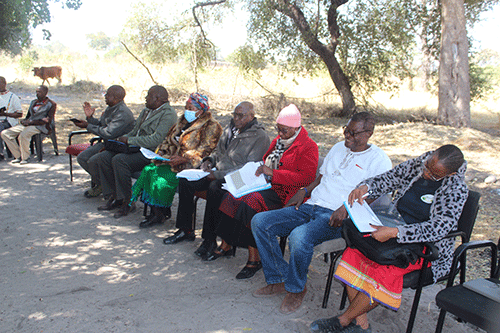George Sanzila
SANGWALI – Residents of the Judea Lyabboloma constituency in the Zambezi region continue to suffer heavy losses from incidences of human-wildlife conflict due to their close proximity to national parks. Two national parks – Nkasa Rupara and Mudumu – border the area in the east and west, respectively. Although conservancies in the area benefit from the inflow of wild animals for tourism purposes, the same cannot be said for residents who live in fear of losing their lives and properties.
A considerable number of incidences of human-wildlife conflict are experienced annually in the area that is inhabited by a large number of game, such as elephants, lions, buffaloes, crocodiles and hippos, among others.
In 2023 alone, over 180 cases involving damages to crops, livestock attacks and even loss of human lives have been recorded so far.
Speaking to members of the Parliamentary Standing Committee on Natural Resources who visited the Zambezi region recently, Balyerwa Conservancy Chairperson Knox Salushando noted that incidences were recurrent, making it difficult for residents to survive, as they depend on crop fields for their livelihood.
He stated that villages falling within his conservancy alone have experienced increasing cases of human-wildlife conflict since 2020.
“In 2020, there were 139 cases, of which 109 were crop fields and 29 were livestock attacks and one human attack. In 2021, the total was 201 with 193 crop field damages and eight incidences of livestock attacks. In 2022, we recorded a total of 188 cases, 180 were crop fields, while eight were livestock attacks. This year so far, we have recorded 180 cases, 168 crop damages and eight cases of livestock attacks. The majority of these cases are caused by elephants,” Salushando revealed.
The statistics provided by Salushando were only for areas such as Nongozi, Mbambazi, Sauzuo, Mambali and Lyanshuru, and they excluded other villages found in other conservancies. There are four conservancies in the Judea Lyabboloma constituency, namely Dzoti, Wuparo and Balyerwa.
During the consultative meeting that preceded the hearing, the Mayeyi traditional authority bemoaned the compensation offered by government to victims of human-wildlife conflict, noting that it was too low.
“The compensation offered it too little. When you lose your cow, you’re offered N$3 000. What do you do with that amount of money? The starting price for cattle now stands at over N$10 000. Family members now are losing their breadwinners and the amount offered cannot even sustain those left behind. It is important that when losses are incurred, government consults the family to determine compensation to be paid,” suggested one traditional councillor.
The traditional authority further complained about a lack of coordination and being sidelined when decisions pertaining to conservation and tourism are taken in the area by the Ministry of Environment, Forestry and Tourism together with conservancies.
“The government is failing to install enough boreholes in villages to prevent people from fetching water from the river to avoid incidences. The same government is responsible for setting up hunting quotas without involving the traditional authority. Trophy hunters are being appointed without our knowledge – and despite our areas infested with problem animals such as lions, they keep translocating them here without our knowledge,” complained the traditional authority.
The community also implored government to consider all animals in the compensation policy as problem animals eligible for compensation, as it became apparent that other animals, such as hyenas, leopards, bush pigs, antelopes, jackals and baboons cause havoc in crop fields.
Leader of the delegation, Agnes Kafula shared similar sentiments, adding that all communities visited have proposed the inclusion of all wild animals in the policy, as damages have equally affected residents regardless of the type of animal.
Currently, compensation is limited to crop damages that are caused only by three problem animals, namely, elephants, buffaloes and hippos.
The community further appealed to government to increase hunting quotas for conservancies and empower residents to kill problem animals when their lives or property are in danger.
However, Salushando revealed during the hearing that the Balyerwa conservancy has benefitted over N$1 million from the Community Conservation Fund of Namibia, which will help its members to come up with mitigation measures to prevent the destruction of crop fields.
These measures will include the installation of predator-proof kraals, tin wire fence and crocodile fence to be erected in the hotspot area of Lyanshulu.
He also shared similar sentiments that the hunting quota for animals needed to be increased to control their population.
Mike Veenani, who forms part of the delegation of lawmakers, implored conservancies to compile accurate data on the numbers of species for parliament to effectively advocate for an increase in the hunting quota.
Another member of parliament Tangeni Iijambo concurred that the lack of water facilities in villages was one of the underlying causes of the increase in human-wildlife conflict, urging government to look into the issue seriously.
The public hearing follows a motion on human wildlife conflict, which was recently tabled in the National Assembly and referred to the committee for further consultations.
*George Sanzila works for the National Assembly in the Division: Research, Information, Publications and Editorial Services.


